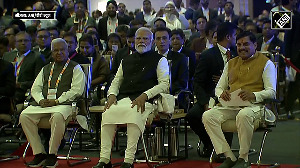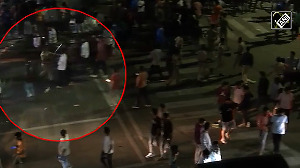The post-Godhra riot victims plea to claim damages from Gujarat for its failure to maintain law and order made the Supreme Court on Tuesday to observe that this could make many states liable as 'there was hardly any law and order in many states'.
This observation came from a bench comprising Justice Ruma Pal, Justice S B Sinha and Justice S H Kapadia during the hearing of an application filed by Amicus Curiae Harish Salve seeking compensation for the victims.
Salve said Gujarat has announced a relief package, which in any case the governments do when the state gets affected by floods, drought or other natural calamities.
Requesting the court to treat riots separately, he said that here the question was linked to Article 21 of the Constitution guaranteeing the right to life of a citizen.
![]()
Also Read
![]()
![]()
![]()
![]()
SC tells Gujarat to reopen riot cases![]()
Discuss: SC blow to Gujarat govt![]()
We will obey the order: Gujarat government![]()
ms welcome SC order on Gujarat![]()
![]()
![]()
"When a state fails to control the law and order resulting in violation of the fundamental right, would it be not liable to pay damages to the victims?" he asked.
Gujarat counsel senior advocate Mukul Rohtagi said the state is paying compensation at present and to decide this larger question linking damages to violation of Article 21, the court must hear all the states.
Agreeing with Rohtagi, Justice Sinha observed: "Today the situation is such, there is hardly any law and order in many states."
The bench then allowed the victims to raise all aspects of the relief package before the Gujarat high court, which was monitoring its implementation.






 © 2025
© 2025